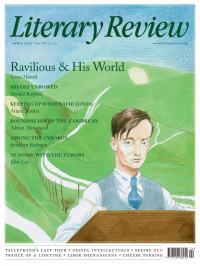Jan Morris
Painting in Verse
The Prelude
By William Wordsworth (Edited by James Engell & Michael D Raymond)
Oxford University Press 281pp £30
I was in transcendental mode when this book arrived. I was searching my mind for different meanings to my life, other tasks, other ways of fulfilment. Could there be subliminal purposes for us all? Ordained by whom? Agnostic that I am, I wondered if there really was some unimaginably different power or spirit out there, and if so, how should we get in touch with it? In the meantime should we rely in our ponderings chiefly upon fact, suggestion, truth or fancy?
In short, I was discombobulated! Everywhere humankind, it seemed to me, was in squalid disarray, ugly and loveless, perhaps beyond redemption: the world, quoth I to myself, was too much with me. Then the postman turned up, and with him came William Wordsworth’s own 18th-century meditations on these

Sign Up to our newsletter
Receive free articles, highlights from the archive, news, details of prizes, and much more.@Lit_Review
Follow Literary Review on Twitter
Twitter Feed
Though Jean-Michel Basquiat was a sensation in his lifetime, it was thirty years after his death that one of his pieces fetched a record price of $110.5 million.
Stephen Smith explores the artist's starry afterlife.
Stephen Smith - Paint Fast, Die Young
Stephen Smith: Paint Fast, Die Young - Jean-Michel Basquiat: The Making of an Icon by Doug Woodham
literaryreview.co.uk
15th-century news transmission was a slow business, reliant on horses and ships. As the centuries passed, though, mass newspapers and faster transport sped things up.
John Adamson examines how this evolution changed Europe.
John Adamson - Hold the Front Page
John Adamson: Hold the Front Page - The Great Exchange: Making the News in Early Modern Europe by Joad Raymond Wren
literaryreview.co.uk
"Every page of "Killing the Dead" bursts with fresh insights and deliciously gory details. And, like all the best vampires, it’ll come back to haunt you long after you think you’re done."
✍️My review of John Blair's new book for @Lit_Review
Alexander Lee - Dead Men Walking
Alexander Lee: Dead Men Walking - Killing the Dead: Vampire Epidemics from Mesopotamia to the New World by John Blair
literaryreview.co.uk